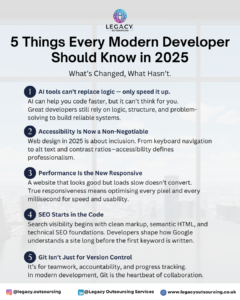What’s Changed, What Hasn’t.
1️⃣ AI Tools Can’t Replace Logic — Only Speed It Up
AI has changed how developers code, test, and deploy, but it hasn’t replaced the human mind behind it.
In 2025, modern web development is about working with AI, not relying on it. Developers who understand structure, logic, and scalability still write the code that machines can’t.
Tools like GitHub Copilot, ChatGPT, and Tabnine make workflows faster, but only logical reasoning ensures that applications are secure, scalable, and maintainable.
AI is your assistant, not your architect.
2️⃣ Accessibility Is Now Non-Negotiable
Accessibility is no longer an afterthought—it’s a standard.
Modern websites must be inclusive for everyone, regardless of ability or device. Developers now prioritise ARIA labels, colour contrast ratios, keyboard navigation, and screen-reader compatibility as part of the build process, not as post-launch fixes.
In the UK, digital accessibility is also a compliance requirement. A site that isn’t accessible risks losing not only users but also credibility and reach.
3️⃣ Performance Is the New Responsive
Responsive design once meant “it fits the screen.”
In 2025, performance defines responsiveness. Google’s Core Web Vitals—Largest Contentful Paint (LCP), First Input Delay (FID), and Cumulative Layout Shift (CLS)—have made speed and smooth interactivity critical to ranking and retention.
A modern web developer doesn’t just check how a site looks on mobile—they check how fast it feels. Image compression, lazy loading, and code minification are part of daily practice, not optional extras.
4️⃣ SEO Starts in the Code
Before content writers start optimising headlines and metadata, developers lay the groundwork.
Clean HTML structure, semantic tags, and proper use of headings (H1–H6) tell search engines what the site is about. Schema markup, canonical tags, and XML sitemaps are now developer essentials for technical SEO.
In short, SEO doesn’t begin with blogs—it begins with your build. Developers who understand search architecture make websites more discoverable from day one.
5️⃣ Git Isn’t Just for Version Control
Version control has evolved from being a safety net to being the backbone of collaboration.
Git enables distributed teams to build faster, test cleaner, and deploy with confidence. In 2025, knowing Git isn’t just a skill—it’s a necessity.
Modern developers use branching strategies, pull requests, and code reviews to maintain transparency and accountability across remote teams. It’s how agile companies keep momentum while maintaining code integrity.

The tools, frameworks, and trends may change, but the principles of modern web development in 2025 remain the same:
Logic. Accessibility. Performance. Visibility. Collaboration.
At Legacy Outsourcing, we help businesses scale with developers who understand both technology and business outcomes.
Whether you need a dedicated team or flexible outsourcing support, we’re here to help you code smarter, not harder.
🔗 Follow us on LinkedIn
📸 Instagram: @legacy.outsourcing

